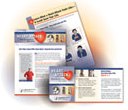Clinical Trials
The National Heart, Lung, and Blood Institute (NHLBI) is strongly committed to supporting research aimed at preventing and treating heart, lung, and blood diseases and conditions and sleep disorders.
NHLBI-supported research has led to many advances in medical knowledge and care. For example, this research has uncovered some of the causes of heart diseases and conditions, as well as ways to prevent or treat them.
Many more questions remain about heart diseases and conditions, including heart attacks. The NHLBI continues to support research aimed at learning more about heart attacks. For example, NHLBI-supported research includes studies that explore:
- How new therapies can help treat heart attacks and improve quality of life for people who have had heart attacks
- The benefits of using certain tests, such as cardiac MRI, to evaluate people who have had heart attacks
- The factors that may play a role in causing heart attacks in women younger than 55 years of age
Much of this research depends on the willingness of volunteers to take part in clinical trials. Clinical trials test new ways to prevent, diagnose, or treat various diseases and conditions.
For example, new treatments for a disease or condition (such as medicines, medical devices, surgeries, or procedures) are tested in volunteers who have the illness. Testing shows whether a treatment is safe and effective in humans before it is made available for widespread use.
By taking part in a clinical trial, you can gain access to new treatments before they're widely available. You also will have the support of a team of health care providers, who will likely monitor your health closely. Even if you don't directly benefit from the results of a clinical trial, the information gathered can help others and add to scientific knowledge.
If you volunteer for a clinical trial, the research will be explained to you in detail. You'll learn about treatments and tests you may receive, and the benefits and risks they may pose. You'll also be given a chance to ask questions about the research. This process is called informed consent.
If you agree to take part in the trial, you'll be asked to sign an informed consent form. This form is not a contract. You have the right to withdraw from a study at any time, for any reason. Also, you have the right to learn about new risks or findings that emerge during the trial.
For more information about clinical trials related to heart attacks, talk with your doctor. You also can visit the following Web sites to learn more about clinical research and to search for clinical trials:
- http://clinicalresearch.nih.gov
- www.clinicaltrials.gov
- www.nhlbi.nih.gov/studies/index.htm
- www.researchmatch.org
Featured Video
The NHLBI "Grand Opportunity" Exome Sequencing Project
-
 Heart Attack Warning Symptoms
Heart Attack Warning Symptoms
10/20/2011
Have questions about heart disease in women? Join The Heart Truth®, Million Hearts™, the American College of Cardiology, and Healthfinder.gov for a World Heart Day Twitter chat on September 28, at 1 p.m. eastern time. Learn more about the history of women’s heart disease research and ask live experts your questions. Go to www.twitter.com, and search for #HeartChat to join the chat.
Clinical trials are research studies that explore whether a medical strategy, treatment, or device is safe and effective for humans. To find clinical trials that are currently underway for Heart Attack, visit www.clinicaltrials.gov.
September 4, 2012
Silent heart attacks are common and predict risk of death, MRI diagnosis shows
Magnetic resonance imaging (MRI) is more effective than electrocardiography (ECG) at identifying "silent" heart attacks, also known as unrecognized myocardial infarctions, according to a study performed by National Institutes of Health researchers and international colleagues.

When a heart attack happens, any delays in treatment can be deadly.
Knowing the warning symptoms of a heart attack and how to take action can save your life or someone else’s.
The NHLBI has created a new series of informative, easy-to-read heart attack materials to help the public better understand the facts about heart attacks and how to act fast to save a life.
Click the links to download or order the NHLBI's new heart attack materials:
“Don’t Take a Chance With a Heart Attack: Know the Facts and Act Fast” (also available in Spanish)
“Heart Attack: Know the Symptoms. Take Action.”
“Learn What a Heart Attack Feels Like—It Could Save Your Life”
The NHLBI updates Health Topics articles on a biennial cycle based on a thorough review of research findings and new literature. The articles also are updated as needed if important new research is published. The date on each Health Topics article reflects when the content was originally posted or last revised.

















 The NHLBI "Grand Opportunity" Exome Sequencing Project
The NHLBI "Grand Opportunity" Exome Sequencing Project